The workplace and experience personal fulfillment
VerifiedAdded on 2022/08/23
|6
|973
|19
AI Summary
Contribute Materials
Your contribution can guide someone’s learning journey. Share your
documents today.
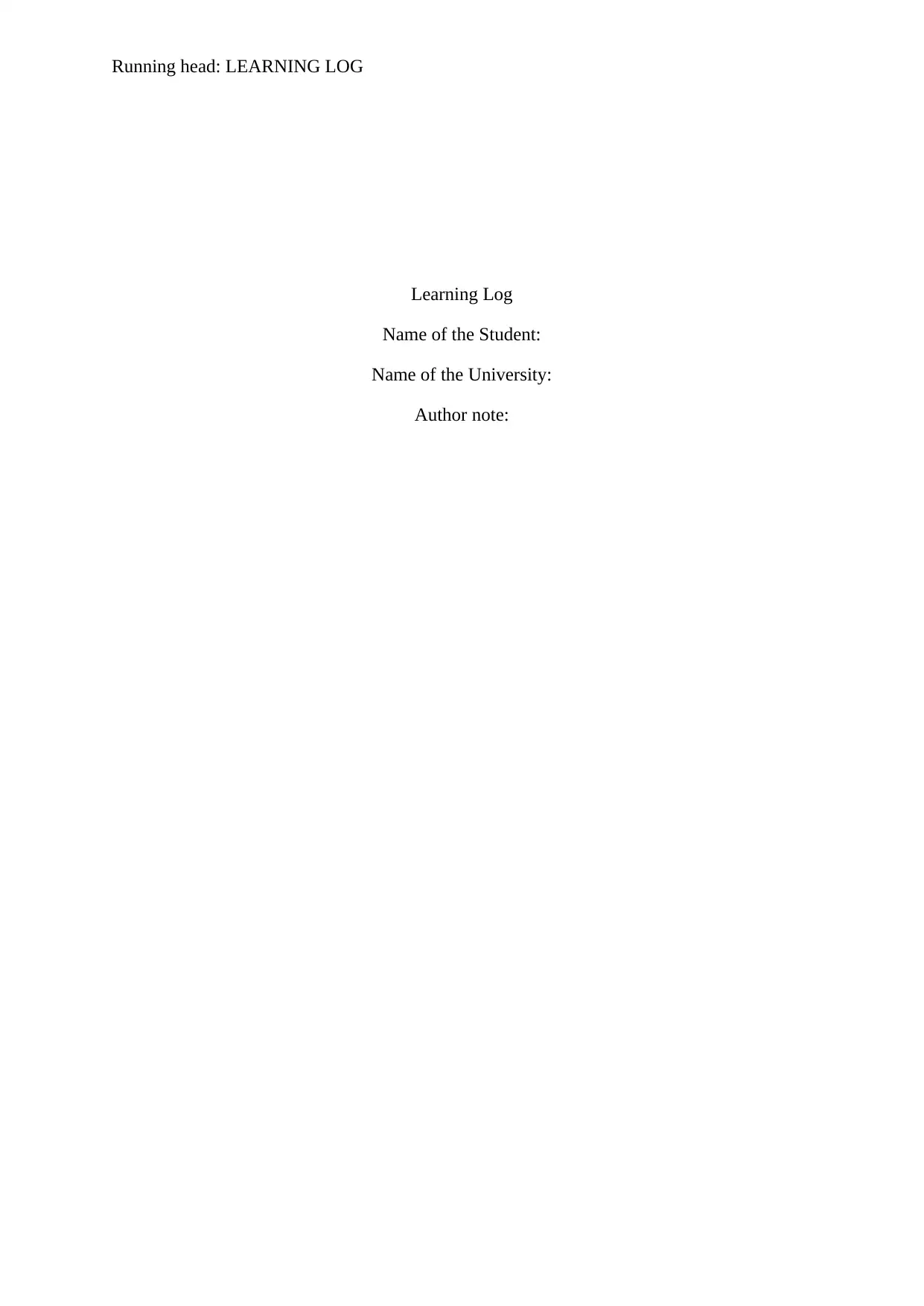
Running head: LEARNING LOG
Learning Log
Name of the Student:
Name of the University:
Author note:
Learning Log
Name of the Student:
Name of the University:
Author note:
Secure Best Marks with AI Grader
Need help grading? Try our AI Grader for instant feedback on your assignments.
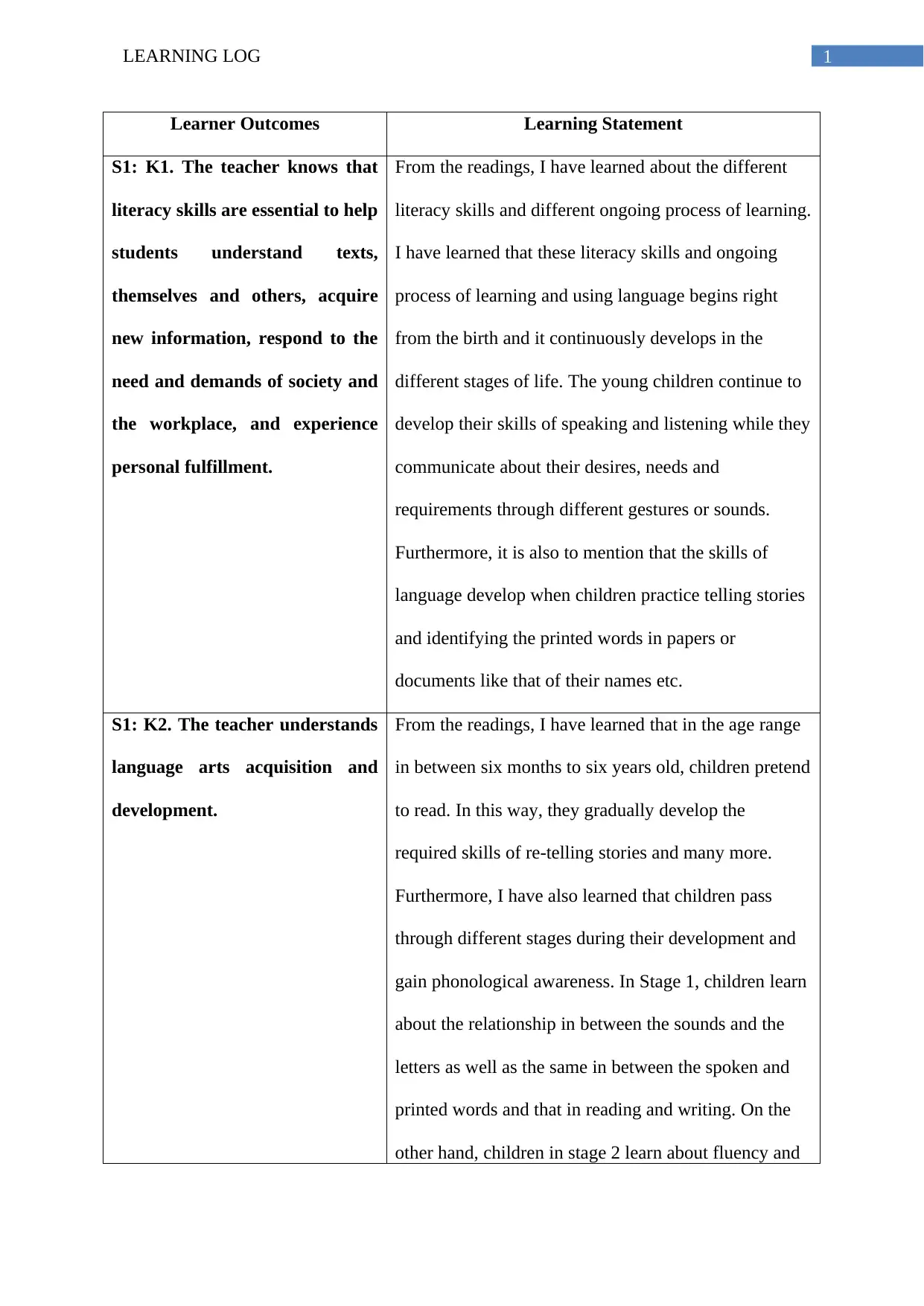
1LEARNING LOG
Learner Outcomes Learning Statement
S1: K1. The teacher knows that
literacy skills are essential to help
students understand texts,
themselves and others, acquire
new information, respond to the
need and demands of society and
the workplace, and experience
personal fulfillment.
From the readings, I have learned about the different
literacy skills and different ongoing process of learning.
I have learned that these literacy skills and ongoing
process of learning and using language begins right
from the birth and it continuously develops in the
different stages of life. The young children continue to
develop their skills of speaking and listening while they
communicate about their desires, needs and
requirements through different gestures or sounds.
Furthermore, it is also to mention that the skills of
language develop when children practice telling stories
and identifying the printed words in papers or
documents like that of their names etc.
S1: K2. The teacher understands
language arts acquisition and
development.
From the readings, I have learned that in the age range
in between six months to six years old, children pretend
to read. In this way, they gradually develop the
required skills of re-telling stories and many more.
Furthermore, I have also learned that children pass
through different stages during their development and
gain phonological awareness. In Stage 1, children learn
about the relationship in between the sounds and the
letters as well as the same in between the spoken and
printed words and that in reading and writing. On the
other hand, children in stage 2 learn about fluency and
Learner Outcomes Learning Statement
S1: K1. The teacher knows that
literacy skills are essential to help
students understand texts,
themselves and others, acquire
new information, respond to the
need and demands of society and
the workplace, and experience
personal fulfillment.
From the readings, I have learned about the different
literacy skills and different ongoing process of learning.
I have learned that these literacy skills and ongoing
process of learning and using language begins right
from the birth and it continuously develops in the
different stages of life. The young children continue to
develop their skills of speaking and listening while they
communicate about their desires, needs and
requirements through different gestures or sounds.
Furthermore, it is also to mention that the skills of
language develop when children practice telling stories
and identifying the printed words in papers or
documents like that of their names etc.
S1: K2. The teacher understands
language arts acquisition and
development.
From the readings, I have learned that in the age range
in between six months to six years old, children pretend
to read. In this way, they gradually develop the
required skills of re-telling stories and many more.
Furthermore, I have also learned that children pass
through different stages during their development and
gain phonological awareness. In Stage 1, children learn
about the relationship in between the sounds and the
letters as well as the same in between the spoken and
printed words and that in reading and writing. On the
other hand, children in stage 2 learn about fluency and
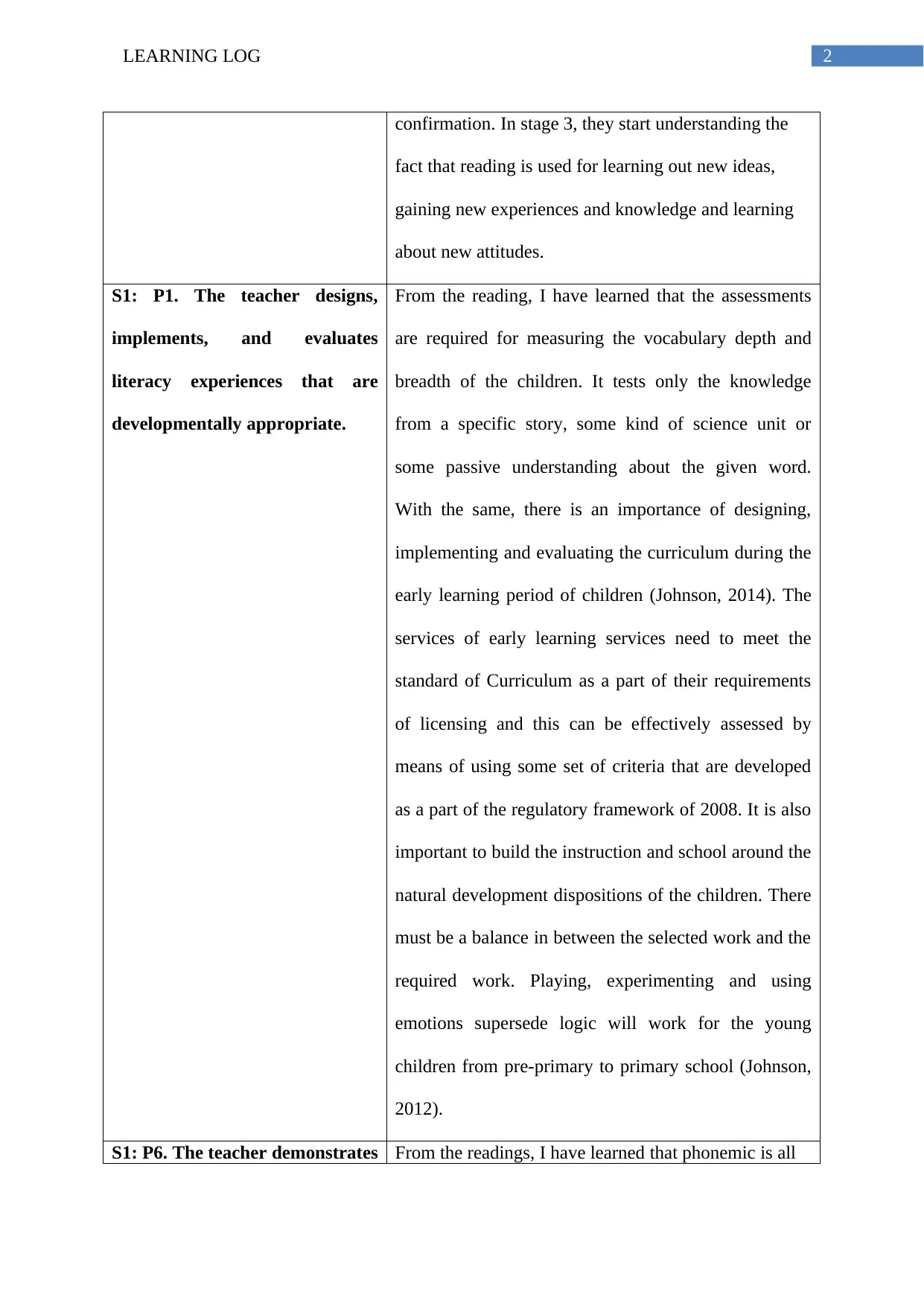
2LEARNING LOG
confirmation. In stage 3, they start understanding the
fact that reading is used for learning out new ideas,
gaining new experiences and knowledge and learning
about new attitudes.
S1: P1. The teacher designs,
implements, and evaluates
literacy experiences that are
developmentally appropriate.
From the reading, I have learned that the assessments
are required for measuring the vocabulary depth and
breadth of the children. It tests only the knowledge
from a specific story, some kind of science unit or
some passive understanding about the given word.
With the same, there is an importance of designing,
implementing and evaluating the curriculum during the
early learning period of children (Johnson, 2014). The
services of early learning services need to meet the
standard of Curriculum as a part of their requirements
of licensing and this can be effectively assessed by
means of using some set of criteria that are developed
as a part of the regulatory framework of 2008. It is also
important to build the instruction and school around the
natural development dispositions of the children. There
must be a balance in between the selected work and the
required work. Playing, experimenting and using
emotions supersede logic will work for the young
children from pre-primary to primary school (Johnson,
2012).
S1: P6. The teacher demonstrates From the readings, I have learned that phonemic is all
confirmation. In stage 3, they start understanding the
fact that reading is used for learning out new ideas,
gaining new experiences and knowledge and learning
about new attitudes.
S1: P1. The teacher designs,
implements, and evaluates
literacy experiences that are
developmentally appropriate.
From the reading, I have learned that the assessments
are required for measuring the vocabulary depth and
breadth of the children. It tests only the knowledge
from a specific story, some kind of science unit or
some passive understanding about the given word.
With the same, there is an importance of designing,
implementing and evaluating the curriculum during the
early learning period of children (Johnson, 2014). The
services of early learning services need to meet the
standard of Curriculum as a part of their requirements
of licensing and this can be effectively assessed by
means of using some set of criteria that are developed
as a part of the regulatory framework of 2008. It is also
important to build the instruction and school around the
natural development dispositions of the children. There
must be a balance in between the selected work and the
required work. Playing, experimenting and using
emotions supersede logic will work for the young
children from pre-primary to primary school (Johnson,
2012).
S1: P6. The teacher demonstrates From the readings, I have learned that phonemic is all
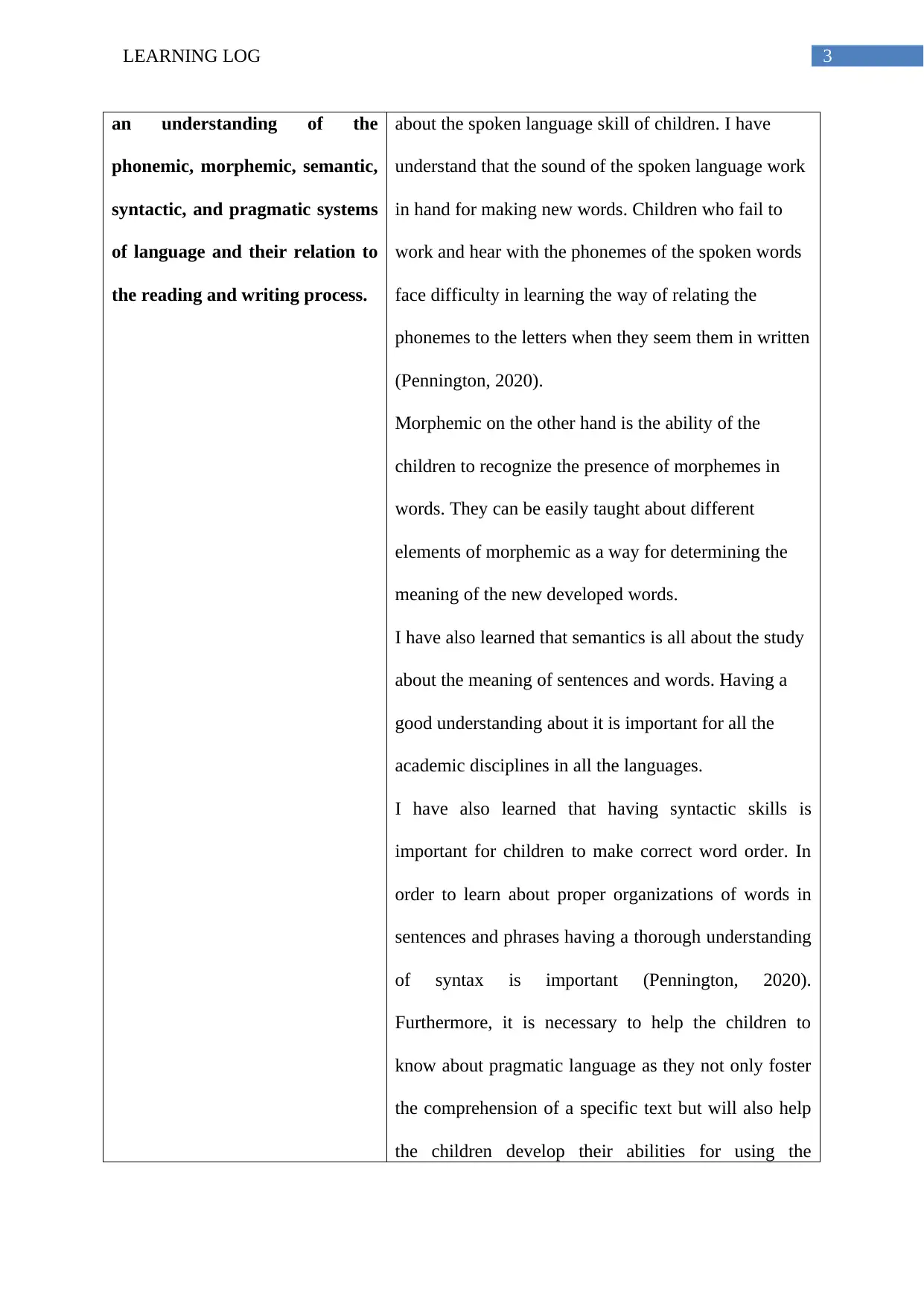
3LEARNING LOG
an understanding of the
phonemic, morphemic, semantic,
syntactic, and pragmatic systems
of language and their relation to
the reading and writing process.
about the spoken language skill of children. I have
understand that the sound of the spoken language work
in hand for making new words. Children who fail to
work and hear with the phonemes of the spoken words
face difficulty in learning the way of relating the
phonemes to the letters when they seem them in written
(Pennington, 2020).
Morphemic on the other hand is the ability of the
children to recognize the presence of morphemes in
words. They can be easily taught about different
elements of morphemic as a way for determining the
meaning of the new developed words.
I have also learned that semantics is all about the study
about the meaning of sentences and words. Having a
good understanding about it is important for all the
academic disciplines in all the languages.
I have also learned that having syntactic skills is
important for children to make correct word order. In
order to learn about proper organizations of words in
sentences and phrases having a thorough understanding
of syntax is important (Pennington, 2020).
Furthermore, it is necessary to help the children to
know about pragmatic language as they not only foster
the comprehension of a specific text but will also help
the children develop their abilities for using the
an understanding of the
phonemic, morphemic, semantic,
syntactic, and pragmatic systems
of language and their relation to
the reading and writing process.
about the spoken language skill of children. I have
understand that the sound of the spoken language work
in hand for making new words. Children who fail to
work and hear with the phonemes of the spoken words
face difficulty in learning the way of relating the
phonemes to the letters when they seem them in written
(Pennington, 2020).
Morphemic on the other hand is the ability of the
children to recognize the presence of morphemes in
words. They can be easily taught about different
elements of morphemic as a way for determining the
meaning of the new developed words.
I have also learned that semantics is all about the study
about the meaning of sentences and words. Having a
good understanding about it is important for all the
academic disciplines in all the languages.
I have also learned that having syntactic skills is
important for children to make correct word order. In
order to learn about proper organizations of words in
sentences and phrases having a thorough understanding
of syntax is important (Pennington, 2020).
Furthermore, it is necessary to help the children to
know about pragmatic language as they not only foster
the comprehension of a specific text but will also help
the children develop their abilities for using the
Secure Best Marks with AI Grader
Need help grading? Try our AI Grader for instant feedback on your assignments.
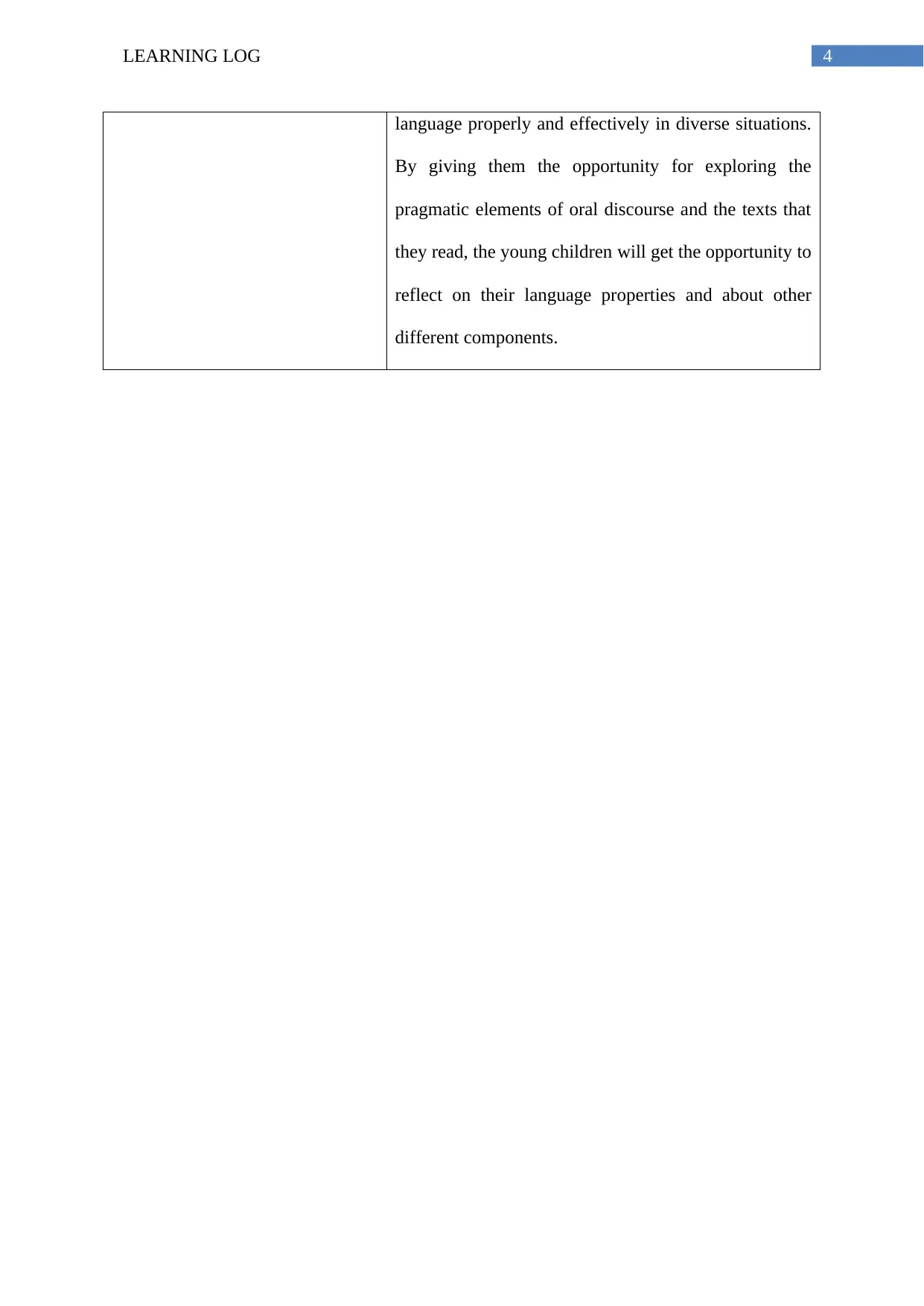
4LEARNING LOG
language properly and effectively in diverse situations.
By giving them the opportunity for exploring the
pragmatic elements of oral discourse and the texts that
they read, the young children will get the opportunity to
reflect on their language properties and about other
different components.
language properly and effectively in diverse situations.
By giving them the opportunity for exploring the
pragmatic elements of oral discourse and the texts that
they read, the young children will get the opportunity to
reflect on their language properties and about other
different components.
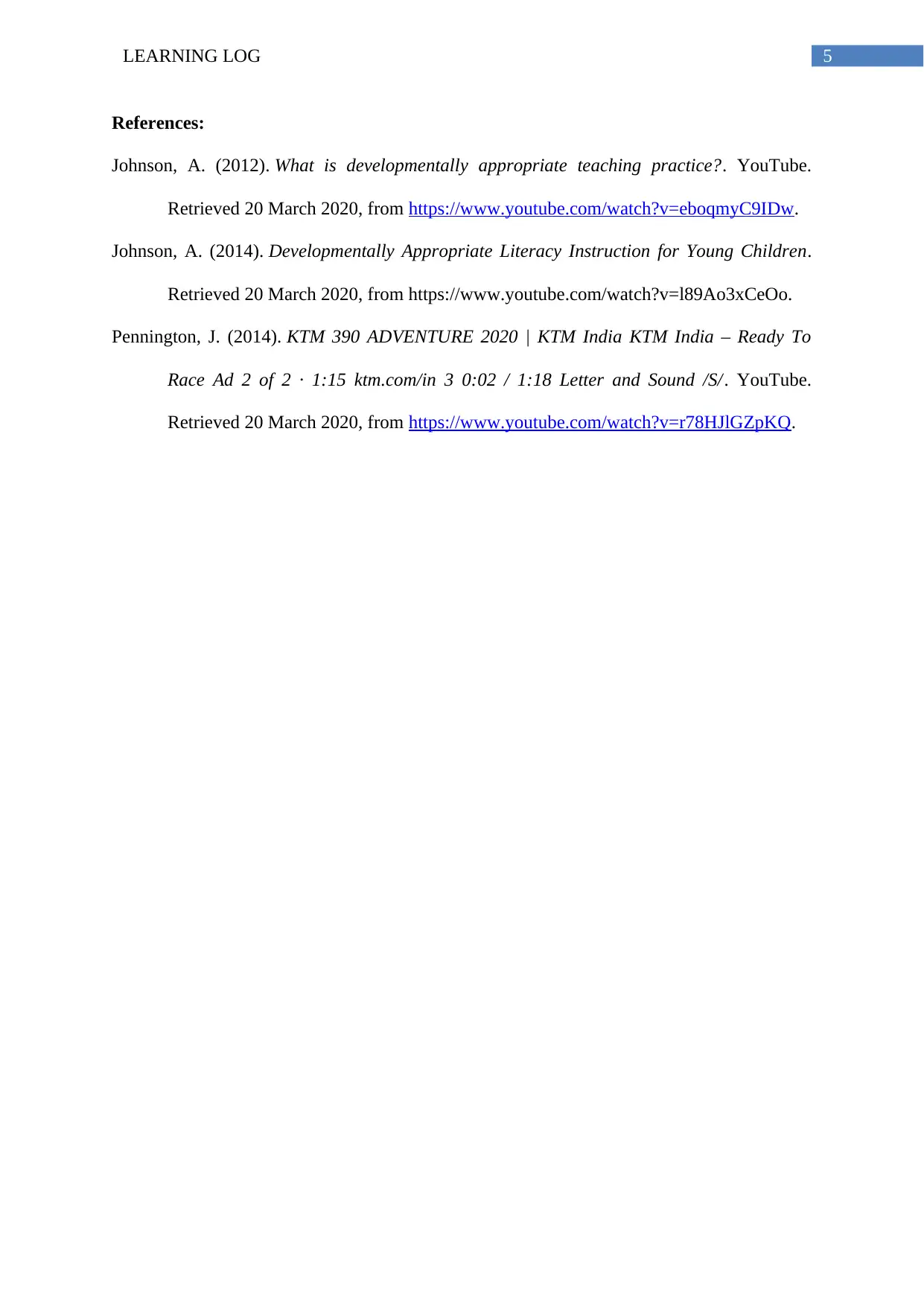
5LEARNING LOG
References:
Johnson, A. (2012). What is developmentally appropriate teaching practice?. YouTube.
Retrieved 20 March 2020, from https://www.youtube.com/watch?v=eboqmyC9IDw.
Johnson, A. (2014). Developmentally Appropriate Literacy Instruction for Young Children.
Retrieved 20 March 2020, from https://www.youtube.com/watch?v=l89Ao3xCeOo.
Pennington, J. (2014). KTM 390 ADVENTURE 2020 | KTM India KTM India – Ready To
Race Ad 2 of 2 · 1:15 ktm.com/in 3 0:02 / 1:18 Letter and Sound /S/. YouTube.
Retrieved 20 March 2020, from https://www.youtube.com/watch?v=r78HJlGZpKQ.
References:
Johnson, A. (2012). What is developmentally appropriate teaching practice?. YouTube.
Retrieved 20 March 2020, from https://www.youtube.com/watch?v=eboqmyC9IDw.
Johnson, A. (2014). Developmentally Appropriate Literacy Instruction for Young Children.
Retrieved 20 March 2020, from https://www.youtube.com/watch?v=l89Ao3xCeOo.
Pennington, J. (2014). KTM 390 ADVENTURE 2020 | KTM India KTM India – Ready To
Race Ad 2 of 2 · 1:15 ktm.com/in 3 0:02 / 1:18 Letter and Sound /S/. YouTube.
Retrieved 20 March 2020, from https://www.youtube.com/watch?v=r78HJlGZpKQ.
1 out of 6
Your All-in-One AI-Powered Toolkit for Academic Success.
+13062052269
info@desklib.com
Available 24*7 on WhatsApp / Email
![[object Object]](/_next/static/media/star-bottom.7253800d.svg)
Unlock your academic potential
© 2024 | Zucol Services PVT LTD | All rights reserved.





